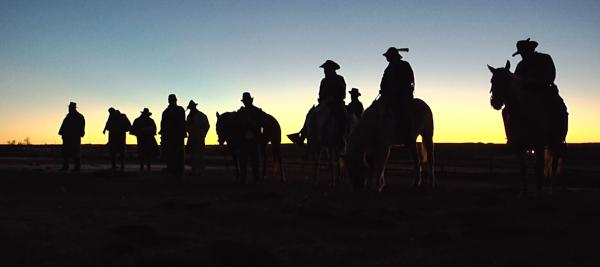
A still from "Savage Land," CCNY filmmaker Campbell Dalglish's award winning film.
Adding to its growing list of accolades, “Savage Land,” by award-winning City College of New York filmmaker Campbell Dalglish, is the winner of the top two awards – Best Story and Best Film -- at the European Fusion Film Festival in the United Kingdom.
Since its premiere at The Americas Film Festival of New York last June, the documentary has raked in a steady stream of awards. Thus far, “Savage Land,” which examines the fatal police shooting of 18-year-old Cheyenne Arapaho Mah-hi-vist Red Bird Goodblanket in his family’s kitchen in Clinton, Oklahoma, back in 2013, has won “Best Feature Documentary” at:
- The Americas Film Festival of New York;
- The Lake Placid Film Festival;
- The 46th American Indian Film Festival; and
- The Europe Film Festival (London, Valencia and Warsaw).
In addition, “Savage Land” is under a two-year exclusive distribution with EPSTV/PBS. It began its run on the PBS channel on Nov. 1, in commemoration of Native American Heritage Month.
“Savage Land began with a City College SEED grant back in 2012 to explore on camera how to build bridges between cultures in Oklahoma through indigenous media,” said Dalglish, associate professor of Film in CCNY’s Division of Humanities and the Arts. “Then on December 21, 2013, Mah-hi-vist Red Bird Goodblanket was shot down in his parent’s kitchen in Clinton where we had been filming by Custer County Police who were responding to a 911 call. Instead of arriving to talk to this troubled youth who suffered from Opposition Defiant Disorder, they arrived heavily armed.”
The documentary is a reconstruction by Dalglish and his co-director, Native American studies scholar Henrietta Mann, of the events leading up to and culminating in the tragic shooting. It includes actual footage and audio of the shooting, as well as interviews with witnesses, Goodblanket family members, and other activists. In doing so, “Savage Land” provides historical context for the discrimination and racism experienced by Native Americans to the present day. It explores the deeper issues afflicting Native Americans that stem from the forced relocation of 39 tribes to what is now the state of Oklahoma more than a century ago.
Film Focus magazine describes the documentary as a “powerful and thought provoking film.”
Echoing this, Bridget Neconie of The American Indian Film Festival, hails “Savage Land” as a “…strong, poignant, powerful and yet fragile film.” She adds: “this film stayed with me long after I had seen it….the story that was told for me was an American horror story and it was like a gut punch…the history that you brought in and weaved into the film of Sand Creek and Washita – the connection – was very real and there were many triggers…and it did leave a haunting feeling…”
“Savage Land” is the latest film by Dalglish, who’s won numerous awards and accolades for socially-conscious films such as “Roadkill” and “Charade of a Fly.”
The documentary’s crew included 13 CCNY film students that had participated in an “Ethnographic Filmmaking” course Dalglish taught for two summers at the Cheyenne and Arapaho Tribal College. They were joined there by filmmaking students from the tribal nations of Oklahoma.
About the City College of New York
Since 1847, The City College of New York has provided a high-quality and affordable education to generations of New Yorkers in a wide variety of disciplines. CCNY embraces its position at the forefront of social change. It is ranked #1 by the Harvard-based Opportunity Insights out of 369 selective public colleges in the United States on the overall mobility index. This measure reflects both access and outcomes, representing the likelihood that a student at CCNY can move up two or more income quintiles. In addition, the Center for World University Rankings places CCNY in the top 1.8% of universities worldwide in terms of academic excellence. Labor analytics firm Emsi puts at $1.9 billion CCNY’s annual economic impact on the regional economy (5 boroughs and 5 adjacent counties) and quantifies the “for dollar” return on investment to students, taxpayers and society. At City College, more than 16,000 students pursue undergraduate and graduate degrees in eight schools and divisions, driven by significant funded research, creativity and scholarship. CCNY is as diverse, dynamic and visionary as New York City itself. View CCNY Media Kit.
Jay Mwamba
p: 212.650.7580
e:
jmwamba@ccny.cuny.edu